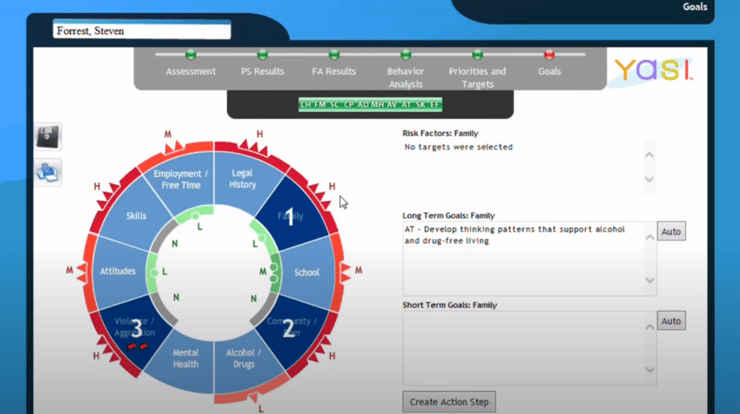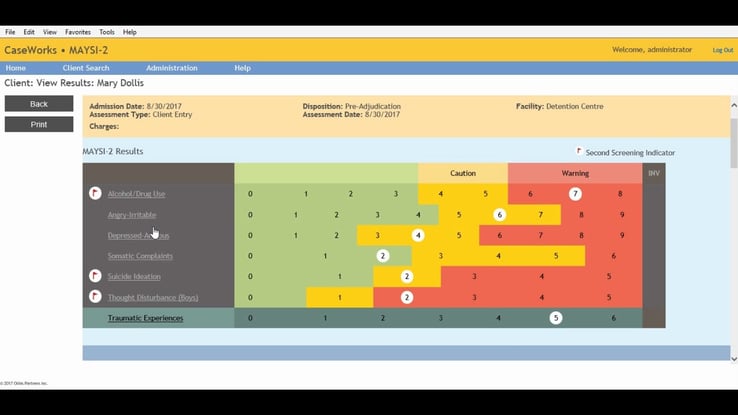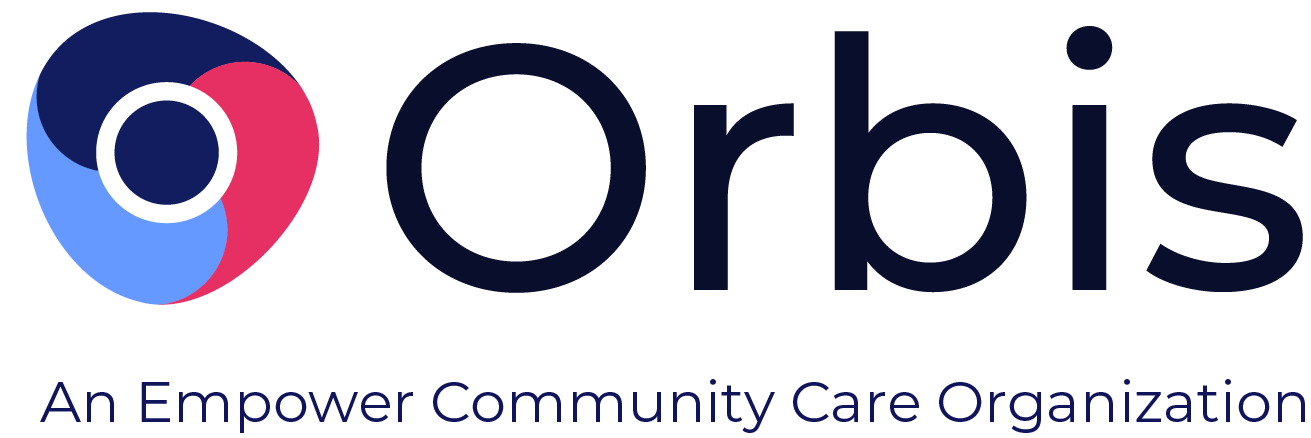Addressing the underlying issues that lead young people to become entangled in our legal system is imperative. But how do we accurately identify and address the needs of these young individuals? How can we create a more informed and compassionate approach to juvenile justice?
Michigan House Bill 4627, which will require a research-validated risk assessment for each justice-involved youth before disposition, has the potential to address these questions and act as a lever of positive change.
What is Michigan House Bill 4627?
As Ken Coleman reported in The 'Gander, Lt. Governor Garlin Gilchrist signed legislation in late 2023 that will "address Michigan's juvenile justice system and invest in diversion and re-entry services to better position Michigan youth for success as adults."
Michigan's Task Force on Juvenile Justice Reform, comprised of justice-involved youth, law enforcement, and advocates, made several recommendations that led to the creation of the legislation, as reported by Anna Liz Nichols in the Michigan Advance. Among the legislative package is Michigan House Bill 4627.
Born out of a collective desire for a more nuanced juvenile justice system, Michigan House Bill 4627 reflects the state's commitment to addressing the unique challenges young individuals face navigating the legal system.
The purpose is clear: to lay down a framework beyond punitive measures, emphasizing rehabilitation and tailored support. By understanding the historical context and motivations behind the bill, we gain insight into Michigan's juvenile justice reform.
Provisions and Requirements
House Bill 4627 mandates a designated individual or agency conduct a research-based and nationally validated risk and needs assessment, such as the Youth Assessment and Screening Instrument (YASI) from Orbis, for each juvenile before disposition (meaning before the court makes a final decision). The assessment must adhere to guidelines established by the State Court Administrative Office under the bill, and the individual or agency conducting the assessment must receive adequate training.
The assessment results, along with the assessment entity's dispositional recommendation, must be shared with the court and all relevant parties, including the young person, their counsel, and the prosecuting attorney. These results should guide the dispositional recommendation, considering the least restrictive setting, public safety, victim interests, rehabilitation, and improved juvenile outcomes, including educational advancement.
The court must consider the assessment results when making decisions, including whether to place the juvenile under supervision, probation, or out-of-home care. The bill also stipulates that a new risk and needs assessment is required if six months have passed since the last assessment, a major life event occurs for the juvenile, or a significant change in the juvenile's proceedings occurs.
Importantly, information obtained during the assessment is not admissible in any hearing and is protected from subpoena or use in other proceedings.
Potential Impact of Bill 4627 on Michigan Juvenile Justice Reform
House Bill 4627 aims to create better outcomes by emphasizing evidence-based practices and consistent research-based approaches. The legislation underscores the importance of providing tailored support to juveniles based on their unique needs and circumstances.
Additionally, the bill emphasizes transparency and collaboration by sharing the assessment results and a dispositional recommendation with the court and all relevant parties involved in the proceedings.
Overall, House Bill 4627, as part of a broader reform initiative, reflects a commitment to fairness, equity, and positive change in Michigan's juvenile justice system. It aligns with the state's vision of ensuring young people receive appropriate care, support, and opportunities for rehabilitation, setting the stage for a more just and compassionate system that promotes the well-being of young individuals involved in the justice process.
As Lt. Governor Gilchrist said in a press release, "Every young person deserves the chance to be successful. This historic legislation will hold our youth accountable while changing how they experience the justice system…It shows Michigan youth that we have their backs, that they matter, and that we believe in them and their futures."
Benefits of Mandatory Juvenile Risk, Needs, and Strengths Assessments
The legislation calls for "risk and needs assessments," which can guide the juvenile justice system toward a more holistic approach. But what do these assessments entail, and how do they contribute to a more comprehensive understanding of a juvenile offender?
The Office of Juvenile Justice and Delinquency Prevention defines risk assessments as "standardized tools that help practitioners collect and synthesize information about a youth to estimate that youth's risk of recidivism and identify other factors that, if treated and changed, can reduce the youth's likelihood of reoffending."
Here are three key benefits of mandatory juvenile assessments:
- Improved Accuracy in Predicting Recidivism: One of the compelling arguments in favor of mandatory juvenile risk, needs, and strengths assessments lies in their potential to revolutionize recidivism prediction. By adopting a data-driven approach, these assessments offer a more nuanced understanding of the factors influencing an individual's likelihood of reoffending.
- More Effective Allocation of Resources: Mandatory assessments empower the justice system to identify specific needs, allowing for a more efficient and tailored distribution of resources. Through the lens of Michigan House Bill 4627, the legislation positions itself as a catalyst for optimizing the potential for rehabilitation.
- Increased Fairness and Equity in the Justice System: Central to the ethos of juvenile justice reform is the pursuit of fairness and equity. Mandatory assessments act as equalizers, ensuring that every young offender is evaluated individually rather than subjected to a one-size-fits-all approach.
Bill 4627 contributes to a justice system that seeks to level the playing field and foster equitable outcomes. Mandating risk, needs, and strengths assessments are not just a required checkbox but transformative tools for positive change by creating more rights for young people and their families.
Orbis Partners: A Leading Provider of Juvenile Risk/Needs Assessments
Orbis offers criminal justice and human services solutions, focusing on creating and applying services for at-risk groups. We provide various programs and services, including advanced case management software, evidence-based interventions, and effective risk assessment tools.
All our offerings are research-based, quality-controlled, and adaptable to any organization's needs.
Evidence-Based Assessment Tools
What sets Orbis apart is our reputation and the arsenal of evidence-based assessment tools we bring to the table. These tools are not mere instruments; they represent a commitment to accuracy, reliability, and a nuanced understanding of juvenile behavior.
One of our tools, the Youth Assessment and Screening Instrument (YASI™), measures risk, needs, and protective factors in at-risk and justice-involved youth. It offers links to case planning, includes strengths assessments, and provides and assesses an abridged pre-screen for early case decisions.
Well-informed, individualized case planning is a critical challenge faced by practitioners using risk assessment tools. YASI™ solves this challenge through its efficient interface that allows users to link client assessment results to tailored case planning and service provision. The model has three main components:
- Mapping: Assessing the young person.
- Planning: Mobilizing youth's motivation.
- Reviewing: Reassessing, reinforcing change, responding to relapse, and managing progress.
As outlined in our YASI™ fact sheet, this assessment tool can accurately predict if a juvenile is likely to re-offend (and by how much), and the domain includes:
- Static Factors: Unchangeable characteristics of a young person.
- Dynamic Factors: A young person's characteristics that can change.
- Protective Factors: Characteristics and innate strengths that reduce the likelihood of recidivism and foster positive outcomes.

Another tool is the Massachusetts Youth Screening Instrument- Web Version 2 (Web MAYSI™ 2). This tool is designed to assess the mental health needs of youth 12-17 in the juvenile justice system.
Web MAYSI™ 2 is a cloud-based, self-administered assessment for the youth to complete and includes questions about their behavior, emotions, and relationships. The assessment is designed to be completed in about 10-15 minutes and can be used to identify youth who may require further evaluation by a mental health professional.
The screening tool is based on research that has identified specific risk factors associated with mental health issues in youth, focusing on 6 clinical scales and one additional scale. Each scale represents some important set of behaviors, thoughts, feelings, or symptoms associated with various behavioral health problems of adolescents. This tool can be a valuable resource for practitioners working with at-risk and justice-involved youth, as well as those working in other community-based settings.

How Orbis Can Help States and Organizations Implement Effective Assessments
The rubber meets the road when it comes to implementation. Orbis isn't just a provider of assessments; we act as a strategic ally in the journey toward an effective juvenile justice system.
From emphasizing individualized evaluations to incorporating risk, needs, and strengths factors, Orbis's methodologies and assessments seamlessly align with Bill 4627’s mandate, ensuring a successful and impactful implementation for anyone who partners with us.
We have over 25 years of experience helping human services and criminal justice systems implement our state-of-the-art web-based assessment and case management tools. Our vast experience and service offerings range from self-paced to highly engaged partnerships that train practitioners to leverage tools like YASI™ and Web MAYSI™ 2.
By designing and offering evidence-based assessments, we help improve accuracy in predicting recidivism, individualized treatment planning, and reducing disparities in the system. To learn how we can help implement youth risk/needs assessments, download our youth assessment brochure today.
Michigan Juvenile Justice Reform: Transforming Young Lives through Mandatory Assessments
Michigan House Bill 4627 will reshape juvenile justice through a commitment to compassion and rehabilitation while acting as a model for other states to implement similar legislation in service of their young constituents.
All states (and organizations within them) should consider Orbis Partners as a strategic ally in implementing effective risk, needs, and strengths assessments. With proven methodologies and evidence-based tools, we can partner together to help turn aspirations of juvenile justice reform into reality.
Orbis Partners provides solutions for criminal justice and human services systems, specializing in designing and implementing services for at-risk client groups. Our risk, needs, and strengths assessment tools are designed to guide the casework process by incorporating an individual's unique needs. For more information about our assessments, visit our Assessments page.


